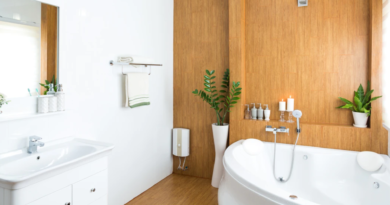How To Make Your Bedroom Sleep-Friendly
A good night’s sleep is crucial for our overall health and well-being. However, many of us struggle to get quality sleep due to various factors, including the environment in which we sleep. Making your bedroom sleep-friendly can significantly improve your sleep quality.
Here are some tips on making your bedroom more conducive to sleep and some considerations regarding Sleep Number return problems.
Keep the Room Dark
Light exposure can interfere with the production of melatonin, a hormone that regulates sleep. Make sure your bedroom is as dark as possible by using blackout curtains or an eye mask.
Additionally, try to limit electronic devices before bedtime as the blue light emitted from screens can also disrupt melatonin production. If you need to get up during the night, consider using a dim nightlight to avoid exposing yourself to bright light.
Maintain a Comfortable Temperature
The temperature of your room can significantly affect your sleep quality. Aim to keep your bedroom comfortable, typically around 65°F (18°C). You can use a fan or air conditioner to cool the room in the summer and a heater to warm it up in the winter. Additionally, consider using breathable sheets and pyjamas to help regulate your body temperature.
Invest in a Comfortable Mattress and Pillows
Your mattress and pillows play a crucial role in your sleep quality. Investing in a comfortable mattress and pillows that provide the right support for your body is essential. If you’re considering a Sleep Number mattress but are concerned about Sleep Number return problems, read the return policy carefully and understand the terms before purchasing. Choosing a mattress and pillows that suit your sleeping style and provide the necessary support to avoid aches and pains is essential.
Use Calming Colors
The colours in your bedroom can also affect your sleep quality. Calming colours such as blues, greens, and greys can help create a relaxing environment and promote better sleep. Avoid bright and bold colours as they can be stimulating and make relaxing harder. Additionally, consider using soft and soothing textures for your bedding and curtains to create a cosy and comfortable atmosphere.
Limit Exposure to Electronic Devices
The blue light emitted by screens on electronic devices can interfere with melatonin production. Limit your exposure to electronic devices at least an hour before bedtime. Instead, consider engaging in relaxing activities such as reading a book, listening to calming music, or practising meditation. If you must use an electronic device, consider using a blue light filter to minimize the impact on your sleep.
Create a Relaxing Pre-Sleep Routine
Creating a relaxing pre-sleep routine can signal to your body that it’s time to wind down and prepare for sleep. Consider incorporating activities such as reading a book, taking a warm bath, or practising relaxation exercises into your routine. Avoid stimulating or stressful activities, such as working, watching TV, or engaging in intense exercise.
Keep the Bedroom Clutter-Free
A cluttered bedroom can create a sense of chaos and make it difficult to relax. Make an effort to keep your bedroom tidy and organized. Consider using storage solutions to keep your belongings organized and out of sight. Additionally, limit the number of items in your bedroom to create a more spacious and calming environment.
Consider Noise Levels
Noise can be a significant sleep disruptor. If you live in a noisy area, consider using earplugs or a white noise machine to drown out external noises. Additionally, limit any internal noises, such as a ticking clock or a noisy air conditioner. If you share your bedroom with a partner who snores, consider using earplugs or noise-cancelling headphones to minimize the impact on your sleep.
Pay Attention to the Smell of Your Bedroom
Certain scents, such as lavender and chamomile, can be calming and promote better sleep. Consider using essential oils or scented candles to create a relaxing atmosphere. However, be sure to choose scents that you find pleasant and not overpowering, as strong odours can be irritating and disruptive.
Making your bedroom sleep-friendly involves creating a dark, quiet, and comfortable environment. Pay attention to the temperature, invest in a comfortable mattress and pillows, use calming colours, limit exposure to electronic devices, create a relaxing pre-sleep routine, keep the bedroom clutter-free, consider noise levels, and pay attention to the smell of your bedroom. Additionally, if you’re considering a Sleep Number mattress, be sure to understand the return policy to avoid any Sleep Number return problems. Sweet dreams!




